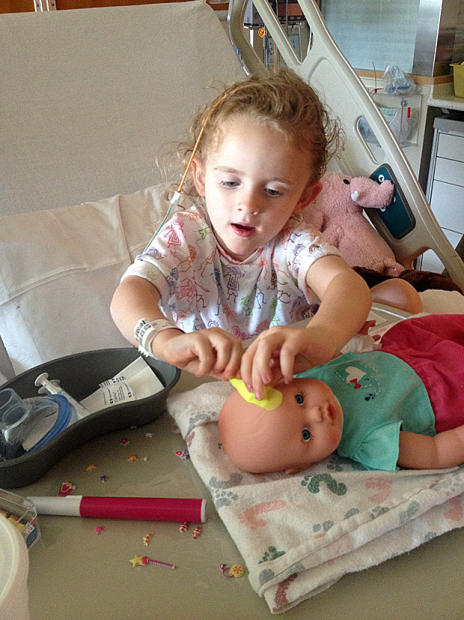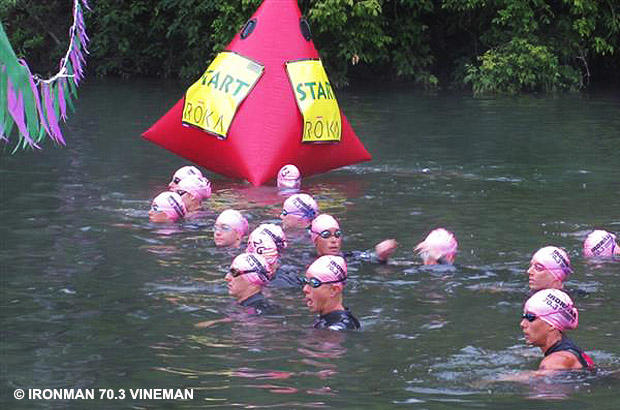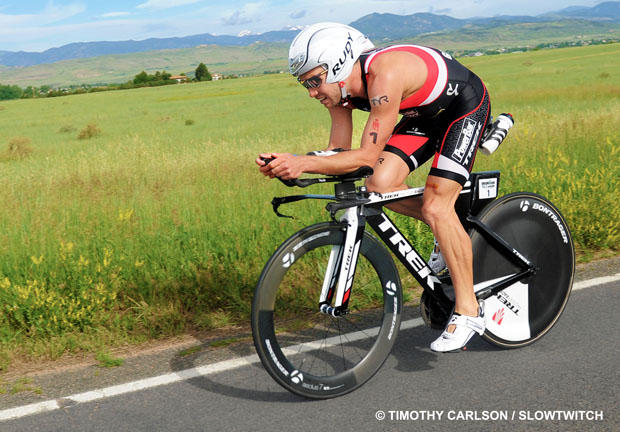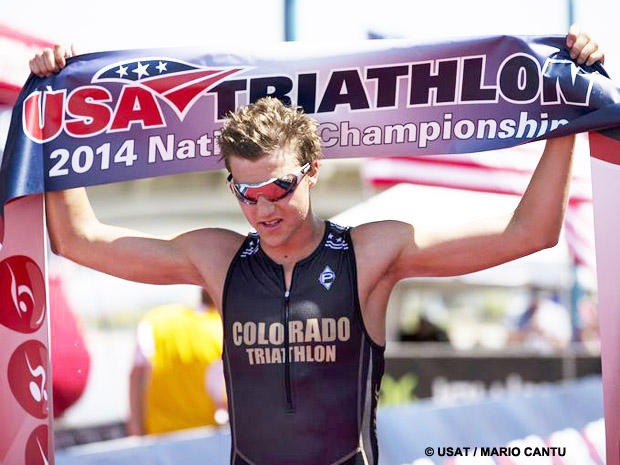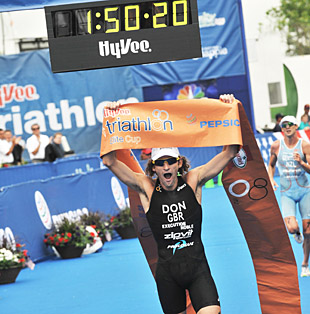The Don takes the long road
Thanks to his very fleet feet, Tim Don has had some of the greatest single days in Olympic distance triathlon. Highlights include winning a duel with Olympic champion Hamish Carter to earn gold at the 2006 ITU World Championship and a $200,000 victory at the 2010 Hy-Vee Elite Cup. During his 19-year pro career, he has won six ITU World Cups, four ITU World championships which also include the 1998 Junior Worlds, 2002 Duathlon Worlds and the 2005 Aquathlon World Championship. Don made three Olympic teams with a best finish of 10th in 2000. Arguably, he might have just found his métier in the last two years he spent focusing on the half Ironman distance. In 2013 his 70.3 record was stellar – wins at Calgary and Augusta, 2nd at UK, 3rd at South Africa and 5th at Vineman. This year he won 70.3s at Monterrey and Brasilia and Rev3 Knoxville. He also took 3rd at St. George and placed 2nd at Vineman — and at Boulder 70.3 during an emotionally distressing time when his daughter Matilda had recently undergone brain surgery.
Despite his initial success, Don is still a bit under the radar at the 70.3 distance since he suffered a puncture and DNF’d his first non-ITU World Championship effort at Las Vegas. At age 36, he has a good shot at the Ironman 70.3 World Championship in Mt. Tremblant and has his eye on fulfilling a boyhood dream at Kona.
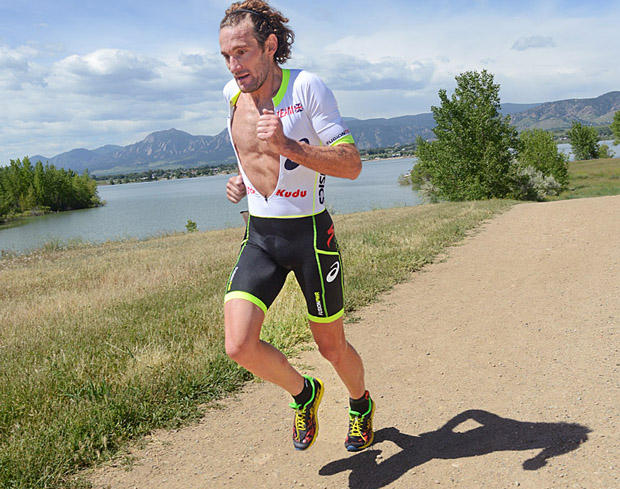
EARLY SPORTS
Slowtwitch: Did you ever play soccer, er, football?
Tim Don I was quite good when I was very young because I was the fastest guy on the pitch and I would play midfield and run all over like a Blue Ass Fly. I played for my school’s first team for 2 seasons. We played every lunch time at school. You put your bags down as the goal posts and you’d play on concrete in pair of school shoes. That probably gave me stronger shins than most people. But I knew I’d never go on to the higher levels.
ST: What other sports?
Tim: When I went to senior school at age 11, I did cross country and I was quite good at that and joined the local running club. I also used to mountain bike at Box Hill – just for fun, I never raced. I had swim squad 3-7 times a week growing up as well just for fun — I loved it !!
ST: You grew up in an English running hotbed.
Tim: I grew up near Mo Farah – the 2012 Olympic 5,000-meter and 10,000 meter champion. His school, Feltham Comprehensive, was a rival of my school, St. Marks RC, in the London borough of Hounslow. We were both members of the Hounslow Running Club, which is now Windsor Slough Eton & Hounslow Athletic Club. In Mo’s book there is a full sized photo of me competing in a race in Bushy Park, which is right next to Hampton Court Palace in Southwest London, where I grew up. It was a 7 mile race and I was competing with Richard Nerurkar, who set a top British marathon time, now held by Mo Farah. So it was great running culture. When the Kenyans first came to Europe, they attended St. Mary’s University in our neighborhood.
ST: Tell us about Bushy Park.
Tim: Bushy Park was a training ground for some of the best runners in the world. It was full of woods, with deer dashing around. I’d be running there and see Daniel Komen, Sonia O’Sullivan and Craig Mottram training. It was a convenient base for runners from around the world because they could travel easily throughout Europe.
ST: Did you run against Mo or other top talents?
Tim: Yes. He was a few years younger, but every cross country season they held interborough competitions in every county. Two boys at my school were outstanding. Sam Haughian ran 13:19 for the 5000m and Ben Whitby ran a 2:15marathon. I was probably top 5 in the county — but just third at my school. Great for training but not for racing!
ST: Were you strictly a runner?
Tim: I could always swim and I used to work as a lifeguard at Hampton open air pool. That is the home of Thames Turbo – a really big triathlon club located right on the river Thames. Spencer Smith was a member as were a couple of other guys on the Junior National team. So I joined the triathlon club and never looked back.
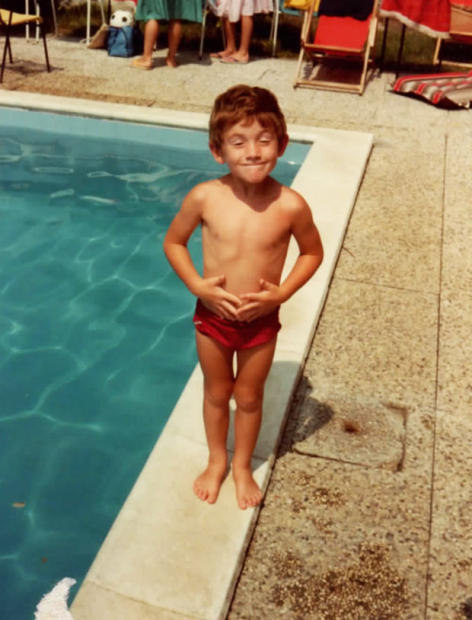
ST: What did you get from being a part of those outstanding runners and triathletes?
Tim: We were just striving for excellence. We wanted to go the Olympics. We wanted to be world champions. And it was just fantastic because we all had that hunger. When I look back at how many successful athletes there were from various sports it was amazing. In fact, my wife Kelly worked with Steve Ovett’s coach Harry Wilson [Ovett was the 1980 Olympic gold medalist in the 800 meters and former world record holder at the 1500 meters and the mile]. And top triathletes Richard Stannard, Stuart Hayes and Dan Hayes lived just a couple of kilometers away.
ST: What was your training like?
Tim: I used to ride my bike to the track and do my Tuesday session and ride home. Thursday night, we’d go to Bushy Park. In the winter we used to do our sessions in a multi-story car park. And on Sunday, we’d do a long run at Virginia Waters near London to get ready for track meets and cross country. It was just guys training hard with a great club coach who wasn't paid at all.
FAMILY TIES
ST: Tell us about your family.
Tim: My mum Judith was a primary school teacher. My father Philip was a headmaster at several schools – and also a referee at football. He worked the World Cup in ’94 as and went to the Olympics in ’92 as a referee.
ST: What did you think of your dad’s referee career?
Tim: I realized I never wanted to be a referee. I went to a game with my granddad and asked him: “Grandad, what’s a wanker?” There were lots of nasty chants. You’re only gonna please 11 players and half the fans at one time. But my dad enjoyed it and he excelled. When he retired he went to work for the Premier League as a director of referees.
ST: He trained and reviewed the referees?
Tim: When my dad started these guys had full time jobs and refereeing was part time. Through his efforts, they upped the pay and it became a full time profession. He held training camps, installed coach and fitness testing and reviewed decision making under pressure. He was very straight laced, very focused and very supportive of the sport.
ST: What traits did you inherit from your parents?
Tim: My parents had a fantastic work ethic. Whatever my dad does he commits 100 percent. I like to think I've inherited some of that. He always stuck by the rules and I like to think I do the same.
ST: Ever rebel against him?
Tim: My parents were both teachers and they wanted me to go to university. And my sister went to Oxford University. But when I finished secondary school in ’96, I said I want to go to Zimbabwe for the winter to train to be a full time triathlete. Up to the mid ‘90s, triathlon was a small sport, not in the same universe as football. If they knew what triathlon is now and what it has given me, I guess they would have said. ‘Just go for it.’ But back then, there was some resistance.
ST: Was becoming a pro triathlete just one step less frightening to your parents than joining Hari Krishna?
Tim: I definitely wouldn't have been allowed to do that! I was brought up very Catholic. But I think they saw I had the love and passion for the sport. I funded it myself as a lifeguard and I did some swim coaching and I did a milk round – whatever I could to pay to go to races.
ST: When you did not attend University, was that a heavy blow to your parents?
Tim: I wouldn’t describe it as a heavy blow. But attending university was the path to a better life.
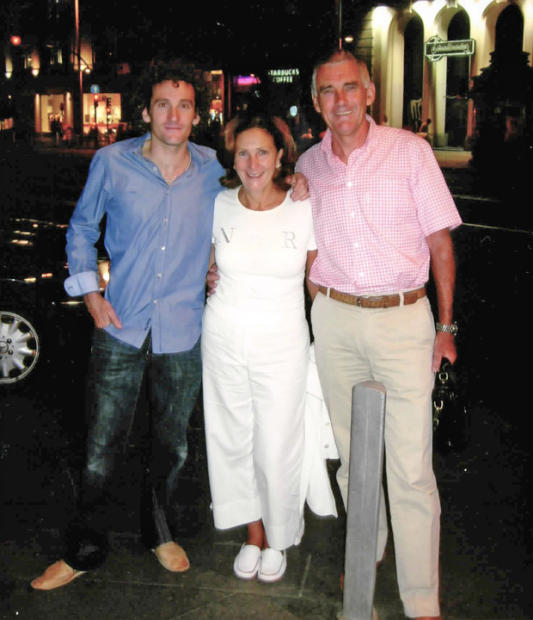
CHOOSING TRIATHLON
ST: When did you start triathlon?
Tim: I did small local races starting in 1990. In ’95, I competed at my first ever world champs. It was the year of the double world championships in Cancun and I placed 69th in the junior world triathlon championship and I got 25th in the junior world duathlon championship.
ST: When did your parents see you had a future in this new sport?
Tim: I think the turning point was when I won the World junior title in 1998. I was offered some relatively good contracts and, as they say, the rest is history.
ST: Who did you beat to win junior worlds in Lausanne?
Tim: Everyone. LAUGHS. Second was Bryce Quirk, an Australian. Next was another Aussie, Levi Maxwell. He beat my friend Stuart Hayes by a whisker — literally one second.
ST: Is Lausanne your good luck city?
Tim: I won three world championship medals there. I won the junior title in 1998. I won the senior title in 2006. And in 2010 I got second to Jonathan Brownlee at the first ITU world sprint champs.
ST: When Alistair Brownlee was recovering from injuries, Jonathan took over while his brother was mending. How have you coped with injuries?
Tim: Don’t ask me that. Touch wood, touch wood. Everyone gets injured. It's how you manage yourself. Some people say if you are not injured, you are not pushing yourself. I don’t agree with that. I've had a few injuries, but I am one of those guys who is very conservative. I went for a run the Sunday before St. George 70.3 this year. I did 200 meters and my left glut wasn’t firing and I just stopped. Some people might have soldiered on. But if I am 1 out of 10 on the pain scale, I will stop. As opposed to some people who will wait until it is 6,7, 8, or 9. They are hard bastards, so they go for it — and they pay for it.
ST: Cutting that workout short worked for you – you took 3rd at St. George. Have you had other injuries?
Tim: I’ve had a pin put in my wrist and I got a broken elbow biking in a race. Kelly my wife says I can train a thousand hours a week and never get injured. But do something clumsy around the house and crazy things happen. I walked into a glass door at home and had to have an operation. I slipped in a wetsuit at a lake and fractured my leg. I was doing tumble turns in the pool and one tile was cracked. I pushed off it and sliced the ball of my foot. Only a few stitches, but you are on crutches and you can’t ride or run for 10 days.
ST: Any injuries at big events?
Tim: When I was racing at the European junior triathlon championships at 16, a marshal ran in front of me and I hit him. It knocked me out for 20 minutes and messed up my knee. The guy I hit I broke three ribs and punctured his lung. I also slipped a disc in my lower back at the UK European cross county trials doing up my shoe lace. I also had a big crash at the 2010 World Champs in Budapest — bloody tram lines!!! I still have funny lumps on my right knee from that. But that is racing. It comes with the territory.
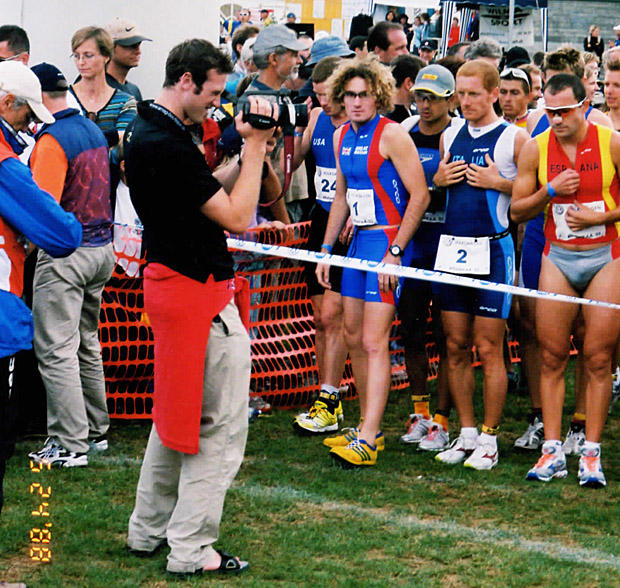
CAREER HIGHS – LAUSANNE 2006
ST: Tell us about your gold medal at Lausanne.
Tim: I was training 50 kilometers away at Leysin, preparing specifically for the 2006 ITU Olympic distance World Championship in Lausanne. Two weeks before, I did a simulation of the course so I was ready. On race day, the defining moment came when Hamish Carter, Kris Gemmell, Frederic Belaubre and some excellent guys led a bike breakaway 45 seconds up the road. I was in the chase pack and as we were approaching one of the big hills I thought, ‘No one is doing anything. We have to do something.’ So I made a solo break to bridge the gap. Once I started, it took me just about a lap to catch the leaders. Then I sat back and rested for a bit before pitching in with my share of the work. By the end of the bike we had just over a minute lead.
ST: How did you break away on the run?
Tim: It was two laps of an out and back course. At the first turnaround I was leading. When I made the turn, I expected to see everyone sitting on me, but it was just Hamish. I was pleased that it was just the two of us. Hamish was the Olympic champ, but there were a lot of solid guys there — Freddy [Belaubre] was the European champ and you can never count Kris Gemmell out.
ST: What next?
Tim: I told Hamish, ‘It’s your turn to lead,’ and he did for a while. Then I took the front again and at 6k I looked around and thought, ‘Shit! I've got 10 meters on the Olympic champion. I better not slow down!’
ST: Some would say ‘Don’t look back.”
Tim: I don’t understand that really. I don't mind leading. It is a two hour race and tactics are involved. I think not looking back is ignorant in some aspects. I slowly pulled away and, as they say, the rest is history.
ST: How happy were you?
Tim: Over the moon. My sister just lives a few kilometers from the race course and my parents and Kelly, my wife-to-be, were also there. It was the first male elite ITU world title Great Britain had since the Simon [Lessing – Olympic distance world titles in 1992, 1995, 1996 and 1998] and Spencer [Smith – 1993, 1994] days. That same day, Will Clarke won the world Under 23s and Alistair Brownlee won the juniors. So it was a good day for Britain.
ST: And Chrissie Wellington won the overall age group women's title!
Tim: I’d been the nearly man that year. I got 4th at the Commonwealth Games and I don’t think I’d won a World Cup. The year before I won three World Cup [Honolulu, Madrid and Corner Brook] and I got several more podiums. So I got the monkey off my back. And it was in Lausanne where I’d won the junior title in 1998 – the year we found out it was an Olympic sport! Happy days!
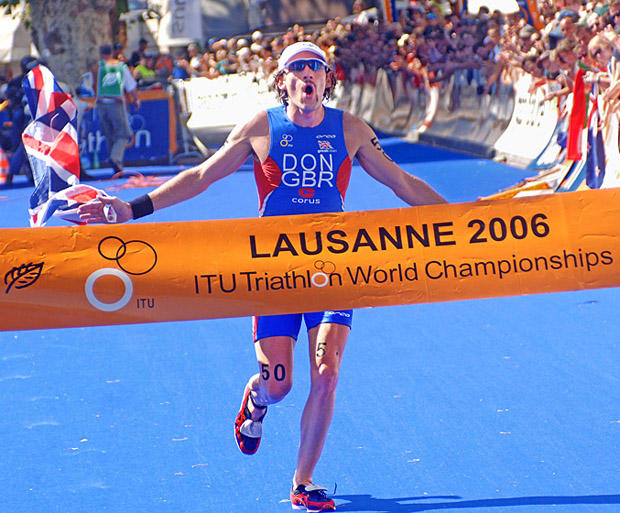
HY-VEE
ST: In 2010, Hy-Vee was held for the final time on the West Des Moines course which was very flat. Why did you do so well there?
Tim: Early that season I was training with Brett Sutton in Thailand, which was bloody hot and humid. So, I was probably the lightest I’d ever been. Brett said there is fast road 10k back in England — go and do that. So I got a start in the elite wave at Manchester and I got 7th in 28:56 — only 50 seconds behind the great Haile Gebrselassie. Hy-Vee was just four weeks after, so I kept my track workouts up. At the race people tried breakaways but no one got away. I had confidence in my run, so I came out hard and by 3k I was on my own with a 30 seconds lead. At that time, a group of strong runners [Kris Gemmell, Courtney Atkinson, Bevan Docherty, Jan Frodeno] started working with each other. But when Greg Bennett pulled out, no one wanted to run at the front. I kept working and by the start of the last lap, Liz [Blatchford] and Helen [Jenkins] shouted ‘You still have 20 seconds.’ I did the math and I knew I could jog the last couple hundred meters. [Don ran a race-best 31:12 10k and won by 3 seconds].
ST: What did you do with the check?
Tim: Kelly and I just got married and she was pregnant with Matilda, so we banked it. It was the most money I ever won – and likely the most I will ever win in this sport. There are no more two hundred thousand dollar winner’s purses to be had at this time.
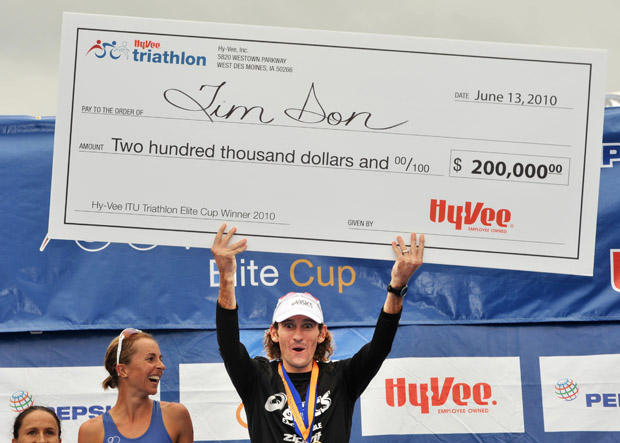
MISSING THE 2012 OLYMPICS
ST: You placed 10th at the 2000 Olympics, 18th in 2004 , and DNF’d in 2008. What stopped you from making your 4th Olympic team at London?
Tim: Politics. I would say that British Triathlon is probably the most successful triathlete federation in the world. We won lots of medals in worlds, Europeans, World Cups, duathlon and Aquathlon.
ST: Not to mention Ironman — but that is not under control of the federation.
Tim: But before London, never in the Olympics. As far as the Federation is concerned, the Olympics are everything and that is why they have approximately a 4 million pound budget before London. The federation coaches didn’t want to lose again, so they decided they would use domestíques to help their best athletes. They picked Vicky Holland and Lucy Hall to support Helen Jenkins and Stuart Hayes to work for the Brownlee brothers. So, if the team didn't win medals, the federation could say ‘We did all we could.’
ST: The men got gold and bronze. Sadly, Helen Jenkins had an injured knee and did an amazing job to finish 5th – and the domestíque strategy did not come into play.
Tim: The men’s results were great. Alistair and Jonny won the medals. But I think they would have won the medals no matter what. Stuart obviously tried hard, but I don’t he had an impact on the race in my opinion.
ST: How tough was it to miss the team?
Tim: I had dedicated my career for the Olympics – and this was in my home country. Prior to the Olympics I was making top 10s against some of the most competitive fields ever. I was in the best shape of my life and was confident I would do well because I wanted to peak in August — not April. I finished 11th at Sydney and 7th at San Diego and it wasn't good enough. But that is sport.
ST: What is it about you that you have some off days and some days that are over the moon?
Tim: I am always looking for that big performance. You have to believe in yourself and with that comes the results. I am normally pretty consistent. But I've had many a lousy day. Shit happens. It is how you deal with it, you know? I am blessed and lucky I've always had good people around me that I trust and people that believe in me.
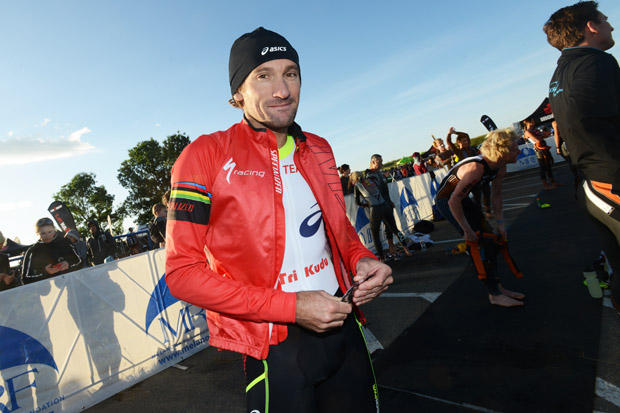
COACHES
ST: Over the years have you had many coaches?
Tim: Not so many. I started with Graham Fletcher, who was the local club coach and I won a junior world title with him. When he moved to the USA, I worked with Dr. Nicholas Romanoff, the Pose Method running coach, as well as Graham.
ST: What did he do for your mechanics of running?
Tim: He made me aware of the importance of biomechanics – the importance of running smoothly, running economy and running efficiency. You have to remember I was young and impressionable. He had great belief on me – and that in itself is so important for the athlete’s confidence.
ST: He was seen by some as controversial. But many top triathletes and runners benefited from him.
Tim: He had a philosophy that is so strong, you have to believe in it to make it work. He did and I did. I still do some of his run drills today.
ST: What are some of those?
Tim: Quick Feet. If I say “quick feet,” some people might say ‘Well, I do that.’ But it might be some slightly different variation. His drills are very much unique and important. He got a contract with the British Triathlon Federation to do run drills with our runners. He did camps with Leanda Cave, Helen Jenkins and quite a few other up and coming females as well as coaching AJ (Andrew Johns) — bloody legend!! And Romanoff was very much working with my old coach Graham Fletcher. When that ended, one of my best mates started coaching me — Craig Ball.
ST: What was his background?
Tim: Craig just missed out on the 2000 Olympics reserve spot because he crashed at the European champs for our selection for Sydney. So he retired. He coached me to my first World Cup win at St. Anthony’s in 2003 and as I made my second Olympics in 2004. In 2005 I started to work with Brett Sutton and Ben Bright took an increasing role coming into Lausanne in 2006. I went back to Brett to try to qualify for London, but in 2011 I left and did some work with Joel Filliol. And I have been working with Julie Dibens since January 2013.
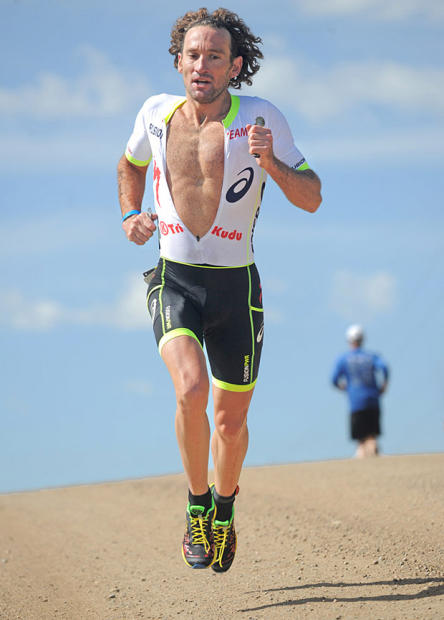
WHY DID YOU MOVE TO 70.3 RACING?
Tim: When I was 12, all I wanted to do was go to the Olympics. But triathlon wasn't an Olympic sport. So I wanted to be World Champion and then go to Hawaii and win that one day sounded easy at the time. When I started triathlon, you’d read 220 Magazine in November and it was Hawaii, Hawaii, Hawaii. You’d read about the Scotts — Dave Scott, Scott Tinley, Scott Molina. Just the epicness of it. I made three Olympics teams, but after the London Olympics, I realized that with the Brownlees’ success, the British Federation would continue to go the domestíque way in the future. So I decided it was time to move up in distance.
ST: What was your first step in coming round to your original triathlon dream?
Tim: I looked into the half Ironman where I had a pedigree to run fast and swim at the front. But I knew over 50 percent of the race at this distance is the bike. I needed not so much to improve but to change. So I sought out Julie Dibens to be my coach.
ST: Why do you and Julie work well together?
Tim: Julie has been to the Olympics, and worked with the British Federation. We've been to many camps together and she knows my strengths and what I’ve done in results and training in these camps. As far as a career, she is just as good as me. She went to the Olympics. She medaled at the European Champs. And she did the transfer to long course fantastically well.
ST: She is the 2009 70.3 World Champion and was 3rd at Kona in 2010.
Tim: I wanted a person who understood the demands of the bike and also understood I didn’t want to lose my speed on the run. And she is a superb swimmer, and could make sure I didn’t lose my advantage in the swim over some of the long distance guys.
ST: When did you start long course competition?
Tim: I did one 70.3 race in 2009, but I started focusing on the 70.3 races in 2013. [and did very well — 1st in Calgary and Augusta, 2nd at UK, 3rd at South Africa, 5th at Vineman and 6th at Rev3 Florida]. Last January I started training in South Africa and Julie and I communicated by email and Skype.
ST: You had been based in South Africa for many ITU seasons. What led you to the U.S.?
Tim: I always say about the ITU – it is very global but not very American. Ironman 70.3 is very American but it is not very global. So I wanted to come to Boulder to center my training and racing. I was lucky enough to get a visa and I met up with Franko Vatterot [manager of Craig Alexander, Leanda Cave and Rachel Joyce and a Retül executive] through John Dennis Head of Retül Europe. But ultimately, my wife had to be happy here. Because a happy home is a performing athlete. So Kelly and I came over for five days without our daughter Matilda to let Kelly get a good feel for the place. She loved it too, so we decided to move here and I started working in person with Julie. I could see Julie every day swimming, she would come to the running track and we rode a lot together. And so our coach-athlete relationship evolved.
ST: I am only slightly joking – can she out split you on the bike?
Tim: Julie and Meredith Kessler outswam the whole elite men’s field at Mt. Tremblant 70.3. I’d like to think Julie could not, for my sake. But I’d like to think she could, for her. But it is silly and irrelevant. Who has the stronger serve? Serena or Andy Murray?
ST: How have you improved under her guidance?
Tim: For me, the key was taking on the harder longer sessions. We did some over-geared sessions, some 20- and 30-seconds sprint sets and some steady long uphill sessions. Of course I did my first senior races in 1996 when we were still non-drafting. So I have been riding a road bike since 1997. l didn’t even ride a time trial bike until fairly recently. So we have changed my position with Ivan O’Gorman at Retül so I am slightly lower and more forward. We are still working on it. For me the key was learning to ride a time trial bike and riding it efficiently at threshold, or just below, for 90 minutes in training.
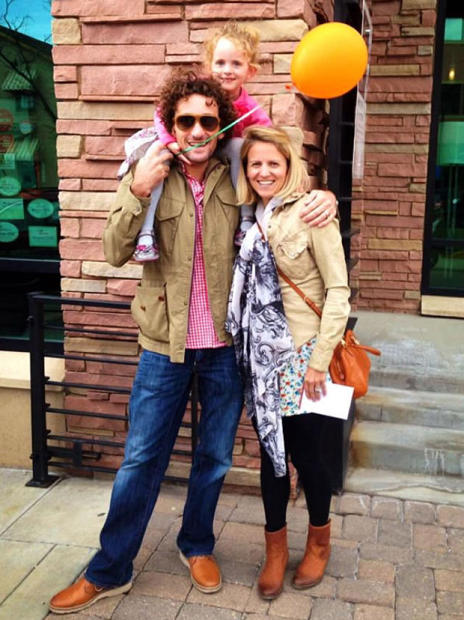
THE EMERGENCY
ST:What was happening with your daughter just before Ironman 70.3 Boulder?
Tim: When your children are young, they are the apple of your eye. Kelly, Matilda and I are very close, because I don’t work 9 to 5 and I am lucky enough to spend more time with my family than most dads. Unfortunately Matilda, who is three, had some headache problems last month, so we took her to the doctors. They thought it could be allergies or sinus so they did a test and put her on a course of antibiotics. She still had headaches, so they tried a steroid spray but she still complained and Matilda’s doctor said, ‘This is not normal.’
ST: When did you know it was serious?
Tim: At the beginning we thought it must be allergies — it was springtime – nothing to worry about. Our doctor said, ‘Well there is no harm, we can give her a proper MRI.’ So we went to Denver Children’s Hospital on a Wednesday and that went well. The next day I finished swimming with Dave Scott’s squad and gave Kelly a call. She said ‘They found a cyst on her brain.’ Which was bleeding, hence the very bad headaches and so we had to be at the hospital at 9:20 the next morning. That morning we saw the neurosurgeon and the neurosurgeon’s nurse told us there was a 5 centimeters by 4.5 centimeters by 2.7 centimeters cyst that was bleeding. They wanted to do what they described as very casual brain surgery. But when you are making a hole in your daughter’s skull, there is nothing casual about it!
ST: What did the doctors do in the operation?
Tim: The next Monday they put a temporary shunt drain coming out of her head to drain 360 milliliters of fluid. We stayed in the hospital 5 days while they decreased the pressure in her head and hoped the bleed had stopped with the pressure release. The headaches were still there but if someone drilled a 1cm hole in your head…… The whole time Matilda was on strong narcotics for the pain and also an IV with antibiotics to ward off infection in the brain.
The hardest thing was the draining tube was tied to a contraption so the pressure was right so the line had to stay level with her collarbone.
If you ever met my daughter, she is no good at sitting still. She would move and we were telling her IN A HIGH PITCHED ANXIOUS VOICE, ‘No, no, no!’ Kelly’s parents flew in from Oxford as soon as we found out about the operation, and they were fantastic.
ST: How did Matilda take it?
Tim: We were numb at first. If Kelly bangs her knee and starts crying ‘Oh my knee!’ Matilda will start crying with her. That’s just what kids do. I guess we had to be stronger than we thought we had to be. But God, kids are so blooming tough! We were nervous wrecks wondering what she would feel about pulling out the shunt. But she was cool as a cucumber. Bloody cooler than me I will tell you. She didn’t have to have a big haircut, which was a good thing thank goodness. But she still has a hole in her skull and the bone will take 8-10 weeks to heal. The surgeon is very happy with how it is progressing at the moment, which is fantastic. Matilda is a superstar. She was absolutely fantastic through the whole thing and we are lucky she is such a tough cookie. A few more MRI's and hopefully the bleed has totally stopped. Well, she was on the trampoline yesterday!!!!
